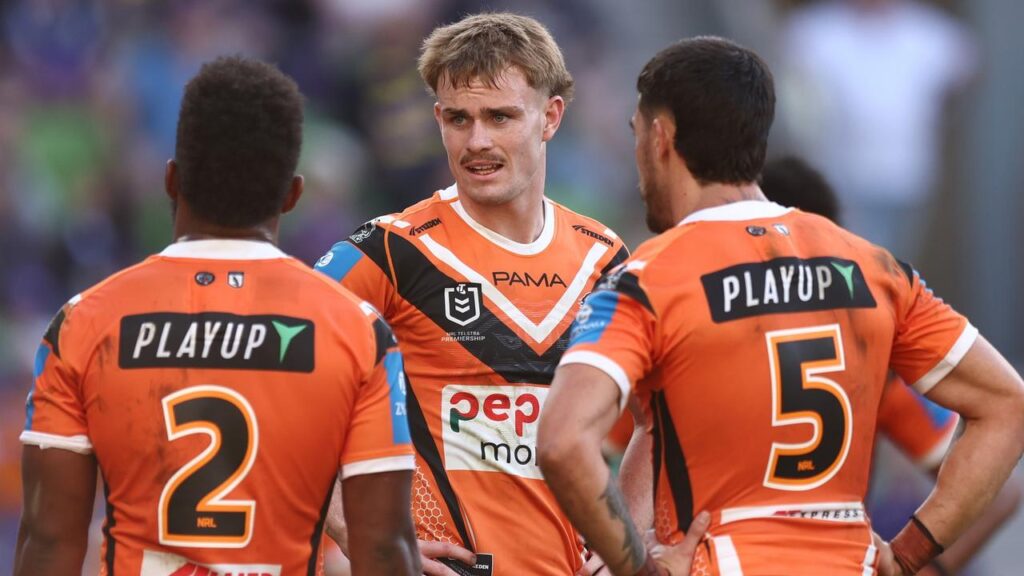
“Performance is a very good mask for mental health. If you can keep turning up and doing your job, nobody bothers to ask.” This sentiment, shared by mental health expert Gary Fahey, underscores a growing crisis within the National Rugby League (NRL) where the pressures on professional athletes are at an all-time high.
The spotlight is currently on Wests Tigers’ young player Lachlan Galvin, who, despite the immense pressure following his contract decision, has managed to maintain his composure. Fahey commends Galvin’s ability to handle the situation, stating, “I think he’s been quite impressive… he’s done very well to front up in the fact that he turned up to play reserve grade, deal with what was in front of him.”
However, the need for a shift in how mental health is perceived and managed in sports is becoming increasingly evident. Fahey argues that mental health should be seen as a performance enhancer rather than a mere checkbox item or a crisis response measure.
The Pressures of Performance-Based Identity
Gary Fahey, who has a background in the Federal Police and is pursuing a PhD in psychology, highlights the dangers of a performance-based identity. This identity, often developed at a young age, can lead to severe mental health issues when athletes face setbacks or retire. Fahey himself experienced a mental health crisis that led to a gambling addiction, losing $2 million and his career.
Fahey is now an advocate for mental health, working with NRL players, Olympians, and golf professionals. He emphasizes the need for athletes to develop coping strategies beyond their sport. “High performance is often mistaken for mental resilience,” he explains, “but when things get hard outside of rugby league, it becomes much more difficult.”
“With high performers, when they break they almost burn the house down with it. Car accidents, domestic violence, violence. Any of those things,” Fahey said.
Statistics and Tragic Outcomes
The statistics are alarming. According to the NRL, 2.4 players in every rugby league team will experience depression at some point. In 2023, 2,419 men across Australia died by suicide, accounting for 75% of all suicides that year, as reported by Life In Mind. Tragically, rugby league has seen its share of suicides, including figures like Paul Green and Mosese Fotuaika.
Fahey warns of the natural progression of untreated mental health issues, which can lead to relationship breakdowns, domestic violence, and even suicide. He stresses the importance of using mental health discussions as performance enhancers to prevent these outcomes.
Changing the Approach to Mental Health
Fahey advocates for a proactive approach to mental health in professional sports. He believes that mental wellbeing should be integrated as a core component of athlete development, much like physical training. “Quite often clubs pin their hopes on policy and tick and flick boxes,” Fahey notes, emphasizing the need for genuine engagement with mental health professionals who understand the athletes’ experiences.
“Mental health or mental wellbeing to me is a performance enhancer. I think the good clubs do this, whether they know it or not. They view mental wellbeing as a performance enhancer,” Fahey asserts.
Role of Former Athletes and Broader Support Networks
To facilitate meaningful conversations, Fahey suggests employing former players as mentors. Athletes like Darius Boyd, Todd Carney, and Mitchell Pearce, who have openly discussed their mental health struggles, can provide valuable insights and support. Fahey also believes that support should not be limited to former rugby league players but should include athletes from various sports who have faced similar pressures.
“I don’t think we have to zero-in only on former NRL players. I do think that high performance resonates across fields,” Fahey explains.
The call for change is clear: mental health needs to be prioritized and integrated into the fabric of professional sports. By doing so, athletes can achieve peak performance while maintaining their mental wellbeing, ultimately leading to healthier, more resilient individuals both on and off the field.
— ARE YOU STRUGGLING AND NEED HELP? CALL LIFELINE ON 13 11 14







